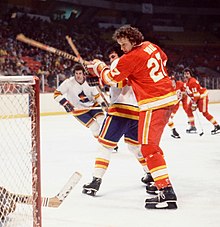History of the National Hockey League/1967–1992/World Hockey Association

In 1972, the NHL faced competition from the newly formed World Hockey Association (WHA). The WHA lured many players away from the NHL, including Derek Sanderson, J. C. Tremblay and Ted Green. The WHA's biggest coup was to lure Bobby Hull from the Black Hawks to play for the Winnipeg Jets. Hull signed a 10-year deal: five years as a player for $250,000 per season, and five more for $100,000 per season in a front-office position. It also included a $1 million signing bonus. The deal totaled $2.7 million, and lent instant credibility to the new league. After Hull signed, several other players quickly followed suit. Bernie Parent, Gerry Cheevers, Johnny McKenzie and Rick Ley jumped to the WHA as the NHL suddenly found itself in a war for talent. By the time the 1972–73 WHA season began, 67 players had switched from the NHL to the WHA. Defections continued following the season, and the WHA scored another major coup when it signed Gordie Howe's sons Mark and Marty. The league then convinced Gordie to come out of retirement to play with them on the Houston Aeros.
The NHL tried to block several of the defections. The Bruins attempted to restrain Cheevers and Sanderson from joining the WHA, though a United States federal court refused to prohibit the signings. The Black Hawks were successful in having a restraining order filed against Hull and the Jets pending the outcome of legal action the Black Hawks were taking against the WHA. The WHA was eager for the court action, intending to challenge the legality of the reserve clause, which bound a player to their NHL team until that team released him. In November 1972, a Philadelphia district court placed an injunction against the NHL, preventing it from enforcing the reserve clause and freeing all players who had restraining orders against them, including Hull, to play with their WHA clubs. The decision effectively ended the NHL's monopoly on major league professional hockey talent.
The NHL also found itself competing with the WHA for markets. Initially, the league had no intention to expand past 14 teams, but the threat the WHA posed changed this. Hoping to keep the WHA out of the newly completed Nassau Veterans Memorial Coliseum in Uniondale, New York and the Omni Coliseum in Atlanta, Georgia, the league hastily announced the creation of the New York Islanders and Atlanta Flames as 1972 expansion teams. Following the 1972–73 season, the NHL announced it was further expanding to 18-teams for the 1974–75 season, adding the Kansas City Scouts and Washington Capitals. In just eight years, the NHL had tripled in size to 18 teams.
By 1976, both leagues were dealing with serious financial problems. Talks of a merger between the NHL and the WHA were growing. Bobby Hull declared that a merger was "inevitable", though WHA president Bill MacFarland stated that his league had no interest in joining with the NHL. In 1976, for the first time in four decades, the NHL approved franchise relocations; the Scouts moved after just two years in Kansas City to Denver to become the Colorado Rockies, while the California Golden Seals became the Cleveland Barons. Two years later, after failed overtures towards merging the Barons with Washington and Vancouver, they merged with the Minnesota North Stars, reducing the NHL to 17 teams for 1978–79.
The WHA's last triumph was to lure junior prodigy Wayne Gretzky to their league in 1978–79. Nelson Skalbania, owner of the Indianapolis Racers and part owner of the Edmonton Oilers, was convinced to sign Gretzky to play for the Racers. The 17-year old Gretzky scored 110 points in his first professional season, split between the Racers and the Oilers.
The move towards a merger picked up in 1977 when John Ziegler succeeded Campbell as NHL president. After several years of negotiations, WHA owners thought they had an agreement in March 1979. The motion to merge failed when supporters in the NHL lost by one vote. Word got out that the Montreal Canadiens, owned by Molson Brewery, and the Vancouver Canucks, who served Molson products at their games, had voted against the merger. Fans across Canada quickly organized a boycott of Molson products, while the House of Commons unanimously passed a motion urging the NHL to reconsider. Another vote was held, and both Montreal and Vancouver switched their votes, allowing the motion to pass. The WHA folded following the 1978–79 season, and the Edmonton Oilers, New England Whalers, Quebec Nordiques and Winnipeg Jets joined the NHL as expansion teams.
